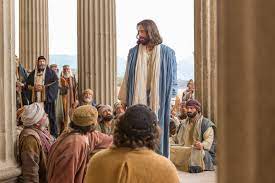Usually, most people look for things that are genuine, ‘the real thing’, they say.
The also want to relate to people who are authentic, they despise any form of pretense.
And of course, they easily detect what is ‘fake news,’ or doubtful information.
It is real appreciation when it is said of someone: “He knows what he is talking about!”
 This expression came to my mind as I read the gospel text of today’s celebration (Mark 1:21-28).
This expression came to my mind as I read the gospel text of today’s celebration (Mark 1:21-28).
The reaction of the those listening to Jesus’ preaching is described in these terms:
“The people were amazed at his teaching,
because he taught them as one who had authority,
not as the teachers of the law”.
This appraisal is repeated after the demoniac present in the group is cured by Jesus:
“The people were all so amazed that they asked each other,
‘What is this? A new teaching – and with authority’!”
Jesus’ words have the ring of truth and authenticity.
His message reaches people’s minds and touches people’s hearts.
At times, reading the gospel texts, some people tend to say:
‘Well, this is good to see but… it happened so long ago.
Nowadays, things are not the same…’
Of course, we do not witness a scene such as the one described in today’s text.
But God’s presence with us through Christ is no less real.
Christ’s message – if we allow it to do so – can also reach our minds and touch our hearts.
When we have an important decision to make…
When we must make a choice heavy with consequences…
When we have to deal with a situation that can have momentous results…
When we must help a person and give some advice that requires more than human wisdom…
Christ’s words, Christ’s real presence will not fail us… if only we entrust ourselves to him.
Having become one of us, he knows what our lives are about…
Note: Another text is available on a different theme, in French, at: https://image-i-nations.com/4e-dimanche-de-lannee-b-2024/
Source: Image: The Church of Jesus Christ of Latter-Day Saints
 They tell Jesus:
They tell Jesus: The Syrophoenician woman we meet in today’s gospel (Mt.15:21-28) may not have known how to read, but…
The Syrophoenician woman we meet in today’s gospel (Mt.15:21-28) may not have known how to read, but…
 there precisely when you need them!
there precisely when you need them!
 There is so much that is wrong in our world today, is it not so?
There is so much that is wrong in our world today, is it not so?
 Strange things happen among us, people.
Strange things happen among us, people.